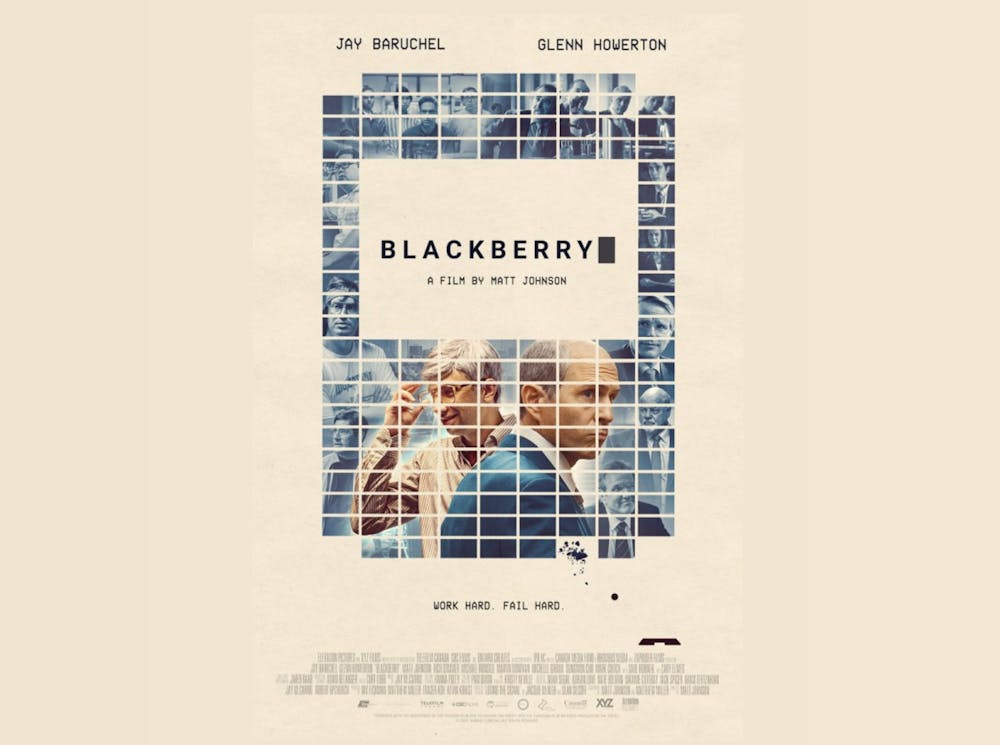At the risk of spoiling history, the BlackBerry is an obsolete smartphone.
To make a movie about this ancient piece of technology may be surprising to some, however the final product is a hilarious and tragic look into the capitalistic world of vanity, greed, denial, and sacrifice.
The film follows co-founders of Research In Motion (RIM), Mike Lazaridis and Douglas Fregin, as they try to market their “PocketLink” cellular device to various businesses. After teaming up with the highly unstable but hypnotic Jim Balsille, the three men rebrand the device, BlackBerry, and quickly become one of the most used smartphones brands on the market.
The movie is shot in a style similar to “The Office” or “Parks and Rec” — handheld and a little crude looking. This gives the scenes a very organic feel and drives home the point that this is a story about the past and a product that will never leave the past.
As the film progresses, we see Mike and Douglas reinvent the very market the smartphone inhabits. They reprogram cellular networks to service every phone without crashing the entire global network and even find ways of mass-marketing their product to get the most people interested.
The knowledge that their company will ultimately fail isn’t the only thing garnering sympathy for Mike and Douglas, however. The script depicts them as sheepish nerds who were having fun in their cramped office playing video games and watching movies before they made it big. When we see them try and fail to recapture that fun workplace later, we know that what made their company special is no more.
The audience wants these lovable losers to succeed — a testament to the brilliant performances of Jay Burachel as Mike and Matt Johnson as Douglas. When Balsille steps into the ring to help them succeed, the tide quickly turns for them and they struggle to maintain control of their vision while Balsille, blinded by greed and ambition, throws constant wrenches in their plans.
Glenn Howerton plays Balsille and is arguably the standout performance of the film. Howerton infuses the character with such a short fuse that his meltdowns — while hilarious — leave you holding your breath in each scene he enters, worried he will explode in colorful language at some frightened employee.
In the third act of the film, the inevitable happens. The iPhone is revealed by Steve Jobs in a powerful scene where the light from the projector overwhelms Mike and Douglas — a fitting visual for the future of their smartphone.
The scene that follows is tragically funny. Confronted by the Verizon board and threatened with the shutdown of his company, Mike has a minor breakdown, insisting that the new iPhone will never take off and that his product, the phone that started it all, will remain the top seller.
The entire film has a tragic weight to it. As an audience in the 21st century, we know that the BlackBerry will fade into history, however, with every scene one finds themself rooting for these Canadian nerds with a dream to succeed — a testament to the strength and quality of the film’s writing, acting and direction.
The final scene of the film is perhaps the most striking. In a final attempt to stay above Apple, Mike breaks his own code of self-manufacturing and outsources touch screen BlackBerry designs to China. He ultimately receives a shipment full of bugs, which he desperately begins to fix, one phone at a time as the camera pulls away, shrouded in the darkness of the warehouse..
‘BlackBerry’ is a new business film for the ages. The way in which humor and tragedy is balanced makes for something enjoyable for all audiences. That and the ingenious business and tech strategies make for an incredibly interesting film that dares to ask the audience how much they themselves would sacrifice in order to succeed.






